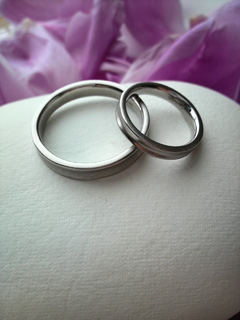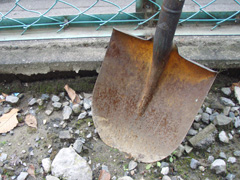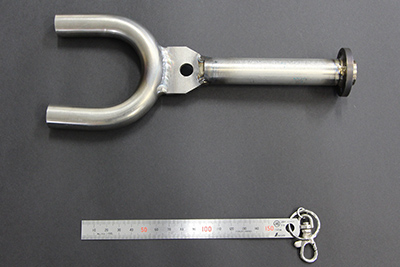Titanium is rustproof metal
Titanium instantaneously forms an oxide film on the surface, so it does not pass oxygen and does not oxidize, so it does not rust.
Titanium does not rust
If made from titanium, it is maintenance free.
Metal that will not rust forever, that is titanium

Corrosion resistance is the same.
She is Titanium!
Even if it is 100 years passed, it will be OK ~ じ ~ ~ ♪
Speaking of the most familiar metal ...? Iron is known as "iron" is not it?
Iron will rust and become ragged as it leaves.
To prevent it from being rusted, oil painting and painting, various techniques and ingenuity have been done.
Still, rust will float in harsh environments such as the seaside.
Oh, I will not rust forever, I wish I could have something that would last a gloss of metal forever ~ I wish there was something that would not rust without doing anything ... · · ·
No, I have no. That is titanium.
Titanium is actually an extremely active metal, and it has strong bonding power with oxygen.
Therefore, although it instantaneously forms an oxide film on the surface, it is an extremely stable passive film, it does not oxidize further because it does not pass oxygen.
Especially in sea water it has corrosion resistance next to platinum. Also, even if the surface can be scratched, the oxide film is repaired instantaneously, so corrosion resistance will be maintained forever.
↓ Click here if you want to make use of it to work or products here ↓
Comparison of titanium and stainless steel
Speaking of rusting, it is stainless steel that you often hear.
Therefore, let's compare titanium and stainless steel in terms of corrosion resistance.
There are many kinds of stainless steel, but once it is quite roughly mentioned, it is an alloy in which chromium and nickel are mixed with iron. Chromium etc. make passive film on the surface, this protects the interior and it becomes a rust resistant metal. So far it is the same as titanium.
Passive film of stainless steel is often destroyed by acid and it is also destroyed by chloride ion. This corrosion resistance to chloride ion is the difference between titanium and stainless steel. (Strictly speaking it is not the only thing, please keep it here.)
Also, stainless steel is an alloy, titanium is a pure metal, a metal element. Again there is a cause of difference in corrosion resistance between titanium and stainless steel. Let's see the actual phenomenon below.
First, let's compare the corrosion resistance in an aqueous solution of sodium chloride. (= Please image as salt water = sea water.)
| concentration(%) | Temperature (℃) | Corrosion rate of titanium | Corrosion rate of SUS 304 |
|---|---|---|---|
| 10 | 24 | 0.127mm / year or less | 0.127~0.508mm/year |
| 40 | 24 | 0.127mm / year or less | 0.127~0.508mm/year |
| 10 | 100 | 0.127mm / year or less | 0.127 ~ 0.508 mm / year However, there is local corrosion |
| 40 | 100 | 0.127mm / year or less | 0.127 ~ 0.508 mm / year However, there is local corrosion |
Oxygen atoms and chloride ions are easy to substitute for the passive film of stainless steel, and metal chloride which is easily soluble in water is produced. And the film of that part will dissolve in water and will be lost. Also, since the radius of the hydratable chloride ion is small, it easily passes through the fine pores of the surface coating (the film is dissolved in water and lost), and if it passes it will rust.
Thus, stainless steel is not corrosion-resistant to chloride ions.

After making the scoop with titanium ...?
It will not rust even if it is covered with mud.
I am not tired because it is light.
You can use it with confidence for things other than earth.
In contrast, since the oxide film of titanium is stable against chloride ions, it also shows extremely high corrosion resistance even in chloride solutions. Titanium is also corroded to reducing acids (such as hydrochloric acid and sulfuric acid), but it is stabilized by adding a small amount of oxidizing agent. In this case, always be careful about the concentration of oxidizing agent.
Besides, corrosion due to alloying to stainless steel or corrosion due to weakness of passive film may occur in stainless steel.
① In the vicinity of the weld zone around the
weld zone, chromium carbide precipitates in the heated location, and the amount of chromium near it is deficient. Therefore, a passive film caused by chromium becomes hard to form and is corroded.
On the other hand, titanium does not impart corrosion resistance by mixing, titanium itself is a substance that forms a passive film, so corrosion resistance will not be reduced by welding (there is no need to take any measures Then, α case is generated and the mechanical properties near the welded part are deteriorated, but this is another story.).
② Gap corrosion, pitting corrosion, stress corrosion cracking When
chloride ions adhere to the surface of stainless steel, the passive film is destroyed as described above, but when stress is applied to that part, deterioration of the metallographic structure In addition to stress and corrosion concentrated on the part where the passive film becomes unstable (the force concentrates on the weak part). As a result, the shape of corrosion becomes cracky and stress concentrates more and more on the tip, so cracks will progress through the crystal flow.
Further, in the cracked portion and the gap portion, since the water therein is not easily exchanged, it is difficult to newly supply dissolved oxygen or hydrogen ions in the water, and as a result, a difference in the concentration of the oxidizing agent between inside and outside of the gap go out. Then, an oxidizing agent concentration cell is formed inside and outside of the gap, so chloride ions migrate from the outside of the crack and become high concentration.
The crack progresses more and more, and in severe cases it will lead to destruction. Somewhat ago, several accidents occurred in welded pipes made of stainless steel at nuclear power plants, cracking considerably before the expected useful life.
Since the oxide film of titanium is also stable against chloride ions, at room temperature it is almost safe for crevice corrosion, pitting corrosion and stress corrosion cracking.
③ Corrosion Resistance Degradation by
Cold Working Although it is recognized as corrosion easily occurs in cold-worked stainless steel, the reason for that is unfortunately not clear. It is thought that grain boundary sliding and concentration of strain to grain boundaries may affect the destruction of the passive film caused by cold working, which could not be regenerated for some reason, and in addition, fine cracks It is supposed to be the cause of such.
Since titanium is a pure metal and the passive film is also strong, grain boundary sliding and the like do not affect corrosion resistance, and in the case of titanium, cracks do not affect corrosion resistance to chloride ions at room temperature I already know.
Use of titanium combined with rust-free metal and other properties is broad
Besides the property that it does not rust, titanium has various characteristics such as light , strong , heat resistant , beautiful , metal allergic reaction not , recyclable , etc. Titanium materials whose maintenance is not too handy, when combined with the characteristics of itself, can be very diverse.
Outdoor equipment, buildings
Titanium is excellent for outdoor facilities and equipment because it does not rust even if it rains or seawater. It is very suitable for infrastructure such as pipes and handrails because roof and walls, bridges and tunnels etc. do not require maintenance in particular. Also, if objects and monuments are also made of titanium, it will be strong and appearance will be high-quality.
vehicle
Since most vehicles are used outdoors, titanium is suitable for an environment that combines corrosion resistance and durability without rust. Titanium is a suitable material from strength, lightness and corrosion resistance to car parts, aircraft, bicycle, ship to spaceship parts products, as well.
Accessories
Titanium can be used as a decorative item because it is not rusty, not cold, light, beautiful. It is hard for decorative items to wear on the body to become rusty and ruin or give bad influence to the body. Also, since allergic reaction does not occur, it can be worn with peace of mind, such as rings, necklaces, earrings etc attached directly to the body.
Titanium product example
It is a marine related part that selected and produced titanium from the property not to rust, durability.
Processed products made with titanium manufactured at Natori Manufacturing Co., Ltd. are widely manufactured from automobile parts, sports goods, welfare tools and so on.
To you who thought that I would like to make it with titanium

 Phone number: 0480-22-3301
Phone number: 0480-22-3301 Fax number: 0480-22-8818
Fax number: 0480-22-8818